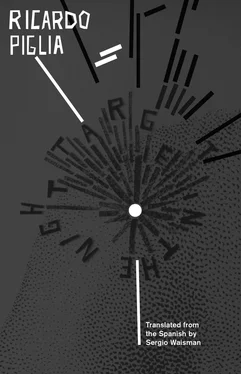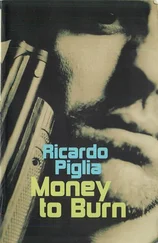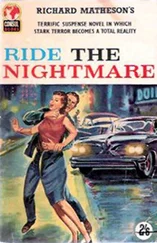Ricardo Piglia - Target in the Night
Здесь есть возможность читать онлайн «Ricardo Piglia - Target in the Night» весь текст электронной книги совершенно бесплатно (целиком полную версию без сокращений). В некоторых случаях можно слушать аудио, скачать через торрент в формате fb2 и присутствует краткое содержание. Год выпуска: 2015, Издательство: Deep Vellum, Жанр: Современная проза, на английском языке. Описание произведения, (предисловие) а так же отзывы посетителей доступны на портале библиотеки ЛибКат.
- Название:Target in the Night
- Автор:
- Издательство:Deep Vellum
- Жанр:
- Год:2015
- ISBN:нет данных
- Рейтинг книги:3 / 5. Голосов: 1
-
Избранное:Добавить в избранное
- Отзывы:
-
Ваша оценка:
- 60
- 1
- 2
- 3
- 4
- 5
Target in the Night: краткое содержание, описание и аннотация
Предлагаем к чтению аннотацию, описание, краткое содержание или предисловие (зависит от того, что написал сам автор книги «Target in the Night»). Если вы не нашли необходимую информацию о книге — напишите в комментариях, мы постараемся отыскать её.
is an intense and tragic family history reminiscent of
, in which the madness of the detective is integral to solving crimes.
, a masterpiece, won every major literary prize in the Spanish language in 2011.
Ricardo Piglia
Target in the Night — читать онлайн бесплатно полную книгу (весь текст) целиком
Ниже представлен текст книги, разбитый по страницам. Система сохранения места последней прочитанной страницы, позволяет с удобством читать онлайн бесплатно книгу «Target in the Night», без необходимости каждый раз заново искать на чём Вы остановились. Поставьте закладку, и сможете в любой момент перейти на страницу, на которой закончили чтение.
Интервал:
Закладка:
“I’m going out for a bit,” Croce said all of a sudden. Saldías looked at him, a little afraid. “You stay and keep guard, we don’t want those worthless bums to come and do anything outrageous.”
Luca had purchased some land outside the town, on the edge, in the deserted plains, a plot, as his father called it, and started building the factory there, as if it were the construction of a dream, a construction imagined in a dream. They had planned and discussed it when they were working in the workshop at the back of the house, in their grandfather Bruno’s studio, and their grandfather had helped them, influenced by his European readings 11and his research into the design of the ideal factory. Luca and Lucio used the workshop as if it were a laboratory for their technical entertainments, that’s where they built their racing cars, that was their schooling, a rich-boy’s hobby. Sofía seemed exhilarated by her own voice and by the quality of the legend.
“It took my father a while to understand. Because before, when they used to go out to the fields and work on the agricultural machines, he didn’t have any problems with them, they’d follow the harvest about, spend long stretches of time out in the country, they’d come back dark as Indians, my mother would say, happy to have them outdoors for months, out with the harvesters and the baling machines, living the clash of two antagonistic worlds.” 12
Her father did not realize that the plague had arrived, that it was the end of Arcadia, that the pampas were changing forever, that the machinery was becoming more and more complex, that foreigners were buying up the land, that the owners of the estancias were sending their earnings to the island of Manhattan (“and to the financial paradise of the island of Formosa”). The Old Man wanted everything to stay the same, the Argentine pampas, the gauchos on horseback, even though he, too, of course, had started to transfer his dividends abroad and to speculate with his investments, none of the landowners were born yesterday, they all had their advisors, brokers, stock transfer agents, they went wherever their capital took them — although they never stopped yearning for the peace of their homeland, the quiet pastoral customs, their paternal relationship with the workers.
“My father always wanted them to love him,” Sofía said, “he was tyrannical and arbitrary but he was proud of his sons, they were going to carry on the family name, as if the last name had a meaning unto itself, anyway, that was my grandfather’s thinking and then my father’s, they wanted their last name to go on, as if they belonged to the royal English family, that’s what they’re like here, they believe in all that, even though they’re all dirty-footed gringos, descendents of Irish and Basque peasants who came here to dig ditches because the locals wouldn’t do it, the foreigners were the only ones willing to roll up their sleeves and dig. 13There was an English ditch-digger, she recited as if she were singing a bolero, who claimed to be from Inca-la-perra. They must have been Harriots or Heguys, digging ditches in the fields, now they act like aristocrats, they play polo in the estancias and flaunt last names that actually came from Irish peasants and rural Basques. Everyone here is a descendent of gringos, especially my family, but they all think alike and want the same things. My grandfather the colonel, for starters, boasted that he was from the north, from Piedmont, unbelievable, he looked down at the Italians from the south, who in turn looked down on the Poles and the Russians.”
The colonel was born in Pinerolo, near Turin, in 1875, and he didn’t know anything about his parents, or his parents’ parents. One story even has it that his papers were falsified and that his real name was Expósito, that Belladona was just the word spoken by the doctor who held him in his arms when his mother died in childbirth in a hospital in Turin. “Belladona, belladonna!” the doctor had said, as if it were a requiem. And that’s the name they registered him with. Baby Belladona. His own son, the first man in the family without a father. And they called him Bruno because he was dark and he looked African. No one knew how he arrived in the Province of Buenos Aires when he was ten years old, with a suitcase, by himself, and ended up in a boarding school for orphans run by the Company of Jesus in Bernaconi. Intelligent, passionate, he became a seminary student and lived like an ascetic, dedicating himself to his studies and his prayers. He could fast and remain silent for days on end; sometimes the sacristan would find him praying in the chapel by himself and would kneel down next to him as if he were a saint. He was always a fanatic, as if he were possessed, intractable. His discovery of science in his physics and botany classes, and his readings of remote, forbidden works from the Darwinian tradition in the monastery library, distracted him from his theology and distanced him — provisionally — from God. This was how he told it himself.
One afternoon he went to his confessor and expressed his desire to leave the seminary and attend the College of Exact and Natural Sciences at the university. Could a priest become an engineer? Only of souls, the priest answered, and refused his request. Bruno rejected his confessor’s ban and kept appealing, but after the Head of the Company refused to respond to his petitions or receive him in person, he wrote anonymous letters which he would leave under the pew in front of the altar. Finally, one rainy summer afternoon, he ran away from the monastery where he had lived half his life. He was twenty years old. With the little money he had saved, he rented a room in a boarding house on Medrano Street, in the neighborhood of Almagro, in Buenos Aires. His knowledge of Latin and European languages allowed him to survive, at first, as a secondary school teacher in an all-boys school on Rivadavia Street.
He was a brilliant engineering student, as if his true education had been in mechanics and mathematics instead of Thomism and theology. He published a series of notes on the influence of mechanical communications on modern civilization and a study on the laying of tracks in the province of Buenos Aires, and before completing his degree he was hired by the English — in 1904—to direct the works of the Southern Railroads. They put him in charge of the Rauch-Olavarría Branch Line and the foundation of the town at the intersection of the old, narrow gauge from the north and the English gauge that continued as far as Zapala, in Patagonia.
“My brother grew up with our grandfather, he learned everything from him. He was an orphan too, or a half-orphan, because his mother abandoned my father when she was pregnant with Luca, as well as her older son, and ran away with her lover. Women abandon their sons because they can’t stand it when they start to look like their fathers,” Sofía laughed. “Who wants to be a mother when you’re horny?” Smoking, the ember glowing in the dark was like her voice. “My father lives here, downstairs, he keeps us with him, and we take care of him because we know that he’s been defeated on all counts. He never recovered from the psychotic decision that his wife made, according to him, to leave when she was pregnant and run away with a theatre company director who was in town for a few months staging Hamlet ( or was it A Doll’s House ?). To live with another and have the baby with another. Whose child was it? He was obsessed, my father. He made his wife’s life impossible. One afternoon he went out looking for her and found her, but she locked herself up in her car, so he started pounding on the windows and yelling and insulting her, by the main square, with people gathering around, delighted, murmuring and nodding in approval. That’s when his Irish wife left, she abandoned both sons, and erased her tracks. Around here the women run away, if they can.”
Читать дальшеИнтервал:
Закладка:
Похожие книги на «Target in the Night»
Представляем Вашему вниманию похожие книги на «Target in the Night» списком для выбора. Мы отобрали схожую по названию и смыслу литературу в надежде предоставить читателям больше вариантов отыскать новые, интересные, ещё непрочитанные произведения.
Обсуждение, отзывы о книге «Target in the Night» и просто собственные мнения читателей. Оставьте ваши комментарии, напишите, что Вы думаете о произведении, его смысле или главных героях. Укажите что конкретно понравилось, а что нет, и почему Вы так считаете.












